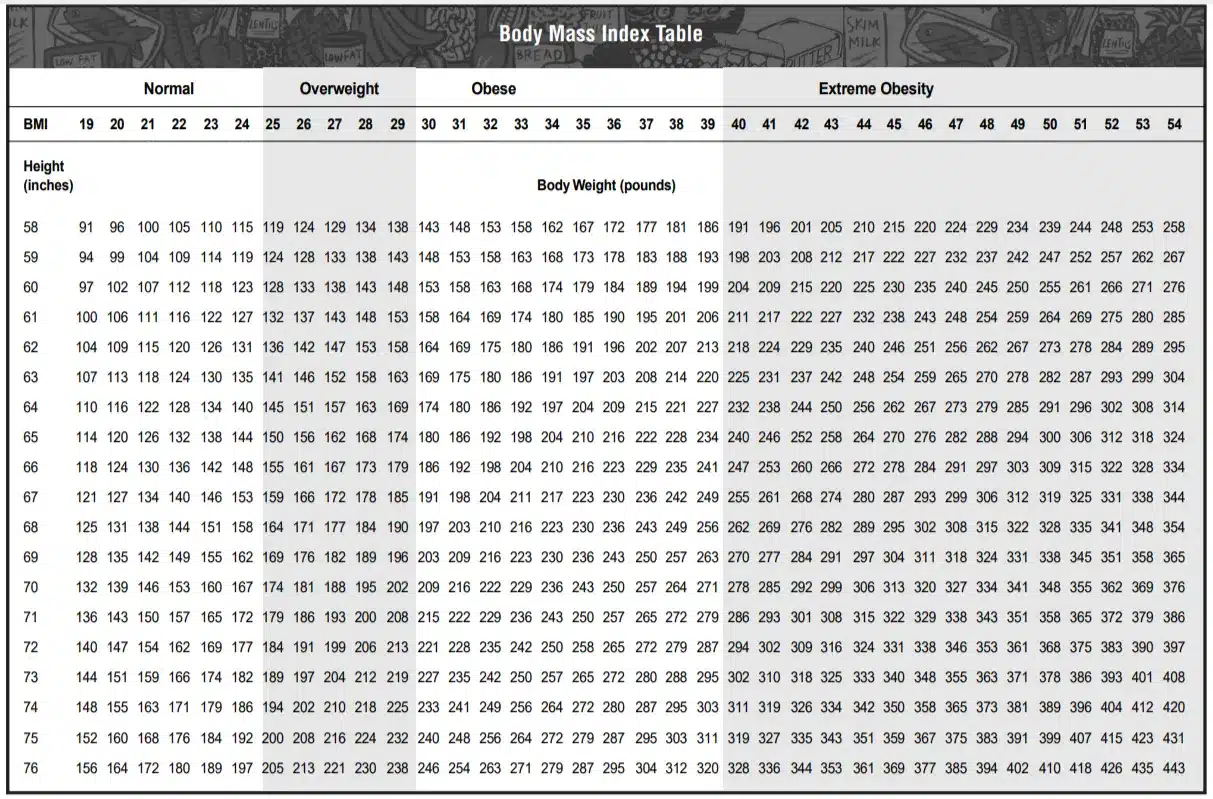
A healthy weight is a crucial indicator of your overall health. The numbers behind it mean having a low risk of weight-related diseases and health complications. It allows you to be physically active and provides enough energy for your daily activities, as well as the key to being at your best and feeling good about yourself.
This article provides an overview of what constitutes a healthy weight and how to maintain it.
What’s a Healthy Weight?
People differ in size and shape, and many factors go into determining a healthy weight. It depends on the height, gender, age, muscle mass, bone density, and genes. For example, if two people weigh exactly the same amount, they may have very different body compositions (i.e., fat vs. muscle).
However, if you need a benchmark, there are some basic tools and guidelines that you can use to determine whether you should lose weight. Here’s what you can use.
- Body mass index (BMI)
- Waist Circumference
- Body Fat Percentage
Body mass index (BMI)
BMI measures your body fat based on the ratio of your height to your Weight. If you have a high BMI, it means that you may be overweight or obese. High body mass index is associated with higher risks of chronic diseases such as type 2 diabetes, stroke, heart disease, and certain cancers. If you have too much body fat, losing 5-10 percent of your current weight may help lower your health risks. (See more details below)
Waist Circumference
It is more harmful to carry excess body fat around your midsection than on your hips and thighs. Measurement of waist circumference can help determine visceral fat, which is dangerous internal fat surrounding internal organs. Men with waist circumferences over 40 inches and 35 inches for non-pregnant women indicate more significant health risks, including heart disease and diabetes.
Body Fat Percentage
Your body fat percentage represents how much fat you have in relation to your total body weight. To accurately determine your body fat percentage, you’ll need to visit a professional or use an at-home method such as skin calipers or bioelectrical impedance analysis (BIA).
How Much Am I Supposed to Weigh According to BMI Chart?
Your best bet is to look at your BMI (body mass index) to show ideal weights for men and women. Calculate your BMI by dividing your total weight in kilograms by your height in meters squared (kg/m2). You can also use the Body Mass Index (BMI) calculator to determine if your weight is unhealthy or not based on height.

So, what BMI typically indicates a normal weight?
In summary, a BMI between 19 and 24 indicates that you are at a normal weight for your height. If it’s between 25 and 29, you are overweight, while a BMI over 30 means that you are obese.
How to Maintain a Healthy Weight
If you want to lose the extra pounds and keep them, here are several ways on how to lower BMI:
1. Follow a Balanced Diet
2. Make Healthier Substitutions for Unhealthy Ingredients
3. Watch Portion Sizes
4. Eat Slowly and Mindfully
5. Drink Plenty of Water
6. Move More, Sit Less
7. Get Enough Sleep
8. Manage Stress
1. Follow a Balanced Diet
Eating healthy food is the first step in losing or maintaining weight. You should avoid eating junk food and foods high in sugar because they have little nutritional value. Eat less saturated fats (found in red meat and high-fat dairy products) and trans fats (found in processed foods). Instead, opt for fresh foods like fruits and vegetables rich in vitamins, minerals, antioxidants, and fiber. Go for whole grains, lean meat, and healthy fats.
2. Make Healthier Substitutions for Unhealthy Ingredients
Making healthy substitutions for unhealthier ingredients is a great way to start getting the foods you love without sacrificing your health. Always ask yourself what ingredients you can change to make your meal a little healthier. Start with the following steps:.
- Choose low-fat dairy products instead of whole milk or cream cheese
- Cook food using avocado or olive oil instead of butter or margarine
- Use whole grain flour instead of refined white flour when making bread and pastries
- Replace regular pasta with whole wheat pasta
- Eat baked chips instead of fried ones
- Instead of processed sugar, use natural sweeteners like honey or maple syrup instead of processed sugar. You can also use fruit to sweeten desserts such as applesauce instead of sugar.
3. Watch Portion Sizes
In recent decades, food portions have grown larger – especially at restaurants, and fast food chains — and so have our waistlines. Reduce your portion sizes. And consuming small meals throughout the day can help you lose weight.
Eat from smaller plates so that your food seems more plentiful than it is. It prevents overeating in one sitting, which helps curb your appetite and prevent binge eating. Avoid skipping meals or snacks because this may cause you to overeat at the next meal or snack.
4. Eat Slowly and Mindfully
To keep a healthy weight and avoid gaining pounds, you must keep close tabs on what goes into your mouth. Stop eating once you feel full. Moreover, eating quickly makes you more likely to eat than you need since your brain takes longer to recognize that your stomach is full if you eat too quickly. Eat slowly enough so that by the time you finish chewing and swallowing each bite, it takes about 15 seconds before the next bite enters your mouth. This will help prevent overeating.
5. Drink Plenty of Water
Rather than drinking sugary beverages like soda or juice, drink water. Switch to skim or 1% milk instead of whole milk or other high-fat dairy products to help keep calories down while still getting the calcium you need for bone health. Avoid drinking too much alcohol since it contains empty calories that can add up quickly.
6. Move More, Sit Less
Exercise helps burn calories, keep your body fit and prevent heart disease, diabetes, and other chronic health conditions associated with obesity. If you like to maintain your current weight or lose weight, be active for at least 30 minutes daily. Exercise can take many forms: walking, stretching, biking, swimming, dancing, or any aerobic activity is helpful. The main point is to move more and sit less!
7. Get Enough Sleep
Sleep is the time when our body rests, repairs, and grows. Sleep deprivation can negatively impact your weight in some ways. If you are not getting enough sleep, your metabolism will slow down, making it harder for you to lose weight. Also, lack of sleep can lead to overeating at night or snacking on high-calorie foods because your body is craving energy.
8. Manage Stress
Stress is detrimental to your health in many ways, including causing weight gain. When stressed out, your body releases cortisol and other hormones that increase appetite and slow metabolism — leading to weight gain over time. If you want to maintain a healthy weight, try meditation or other stress-relieving techniques such as exercising or listening to music.
Healthy Weight = Healthy Life!
Healthy weight maintenance is one of the most important things you can do for your health. As long as you keep a healthy and positive attitude, you can make the right decisions that will help keep you at a good weight. The healthier changes you make in the right direction, your body will become stronger, thus helping you live a longer, healthier life.
Take action early to make healthy choices! At Premier Health and Wellness Center, we offer a range of weight loss programs customized to suit your needs. Book an appointment online or call 441-292-5111 to speak with one of our health care providers and let them help you get a recommended weight loss program that is right for you!
